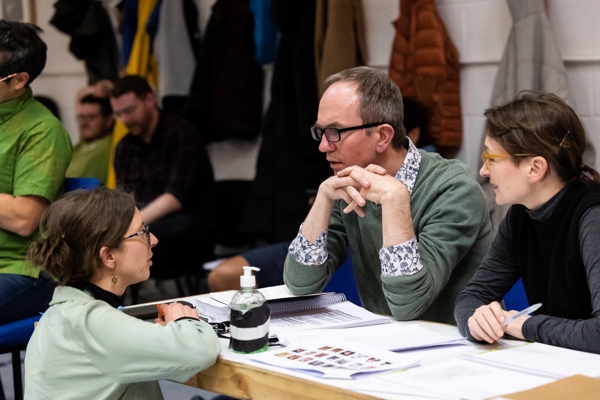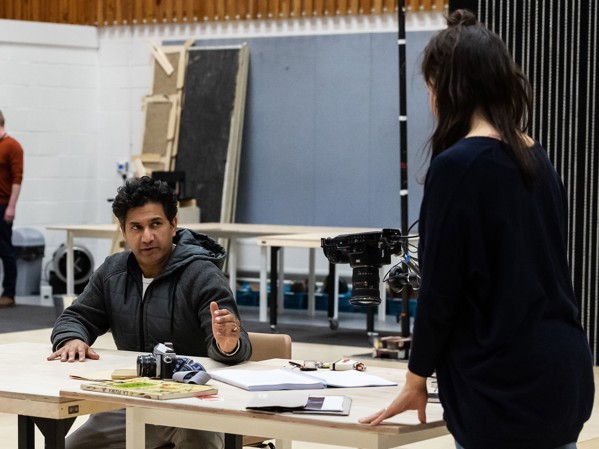Our new production of Georges Bizet’s Carmen boldly updates the fiery classic with a new crime drama twist and English translation. Ahead of its opening, Director John Fulljames and translator Christopher Cowell discuss faithful storytelling within a new setting.
The popularity of Georges Bizet’s Carmen brings many to the theatre with preconceptions firmly in place. For Scottish Opera, director John Fulljames – inaugural Director of Oxford University’s Humanities Cultural Programme – and translator and librettist Christopher Cowell have reframed (not ‘reimagined’, Chris stresses) the classic crowd-pleaser into something new and exciting for opera buffs and newcomers alike. At the heart of this interpretation is a fundamental fidelity to Bizet and Prosper Mérimée, author of the original novella, alongside a staunch belief in the immediacy and impact of storytelling in a country's native language.
Mérimée’s tale is told through an unnamed narrator to whom Don José confesses his murderous actions and doomed obsession. In Chris’ and John’s production, this testimony frames the famous music. The narrator becomes a detective probing José’s motivations. ‘We decided to take the story back to its roots with a new version of the spoken text, to honour the original importance of both text and music,’ says John. ‘I was fascinated by José’s futile attempts at self-understanding and self-justification. Through this lens, the opera makes so much sense. This was a story looking inside the mind of someone who has killed their former partner. It is a story about what we would now call domestic violence. This is not an easy subject to put onstage but there is an important story to tell. I hope this approach gives us a good context to really get to the heart of this dark piece.’
 Director John Fulljames with Assistant Director Roxana Haines and Movement Director Jenny Ogilvie
Director John Fulljames with Assistant Director Roxana Haines and Movement Director Jenny Ogilvie
Chris stresses that the plot of Carmen is ‘absolutely intact’ and the new officer is not a protagonist. ‘She is a vessel for information and a provocateur to dig into how much José is the author of his downfall. José is often seen as a victim of Carmen and her belief in fate as opposed to agency; therefore, one does not need to analyse what is fundamentally at fault in José. So he is forced to consider how unreliable a narrator he is. He claims Carmen destroyed him deliberately, but it’s not so simple. You can’t portray José as the helpless victim of a designing woman, because he’s not in Mérimée or Bizet.’
To this end, the opéra comique dialogues and Parisian recitatives have been replaced with brief scenes. ‘Carmen has a long and complicated history,’ John explains. ‘In recent years it has been performed with radically shortened dialogues or no dialogues at all. There are several reasons for these choices including perhaps that while Bizet’s music is loved, the dialogues do not hold up as successfully. It often feels as if artists and audiences would rather just get on with the great music! But this generates problems as it isn’t the intended storytelling structure and by removing the texts there is an inevitable shift in focus.’
‘Because she’s the title role, audiences often assume that it’s the Carmen show,’ says Chris, ‘but the novella is José’s confession.’ In Mérimée, José flees from the Basque Country to Seville after killing a man over a game of pelota; ‘he comes with serious baggage and a propensity for violence.’ Operas rely on music to convey what cannot be captured in the sparsity of libretti (opera scripts and lyrics). ‘Librettists in the 19th century had a code – certain vocabularies implied emotional or moral states. José’s weakness is encoded in his attitude whereby he does the dishonourable thing and leaves his regiment – that’s moral ambiguity at best and moral depravity at worst and it’s within José himself, not Carmen.’
José may not feel at ease within his regiment, but his membership of a group with a toxic and corrupt culture was a reason for setting the production amidst the post-Franco political instability of 1970s Spain. ‘There is a huge amount at stake for society, as a brutal police force cracks down on dissent and protest. Carmen is a threat to a toxic patriarchy institutionalised in a corrupt police force.’ This tension is supported in the music. ‘Carmen sits between opéra comique, with its entertainment and spectacle, and the grittier form of verismo – something true to life and depicting humanity’s dark underbelly,’ John says. ‘We wanted to bring this mix to life, and situate the story in a world close to our own. Bizet didn’t locate the story two hundred years from his own time.’
‘The 1970s were also a time of great change around gender; previously male institutions began to be unpicked from the inside. Women were entering police forces and, in literature and television across Europe, we see female investigators fighting crime and corruption. We felt that such an investigator could be a modern version of Mérimée’s narrator – revealing the reality of Carmen’s life and the world of toxic masculinity in which she is forced to live.’
 Alok Kumar (Don José) and Carmen Pieraccini (actor) in Carmen rehearsals
Alok Kumar (Don José) and Carmen Pieraccini (actor) in Carmen rehearsals
Chris fell in love with Carmen through the soundtrack of Carmen Jones – a 1954 film directed by Otto Preminger that retells Bizet’s opera in the American South during World War II; ‘when I first heard the opera I thought it was an adaptation of Carmen Jones’. For him, Oscar Hammerstein II’s lyrics remain an ‘absolute model’ for opera in English. ‘The text was colloquial and racy. It was rhythmic. It was energetic. It was funny.’ In a similar vein, he strongly believes opera to work best in the vernacular – in English-speaking countries, this means singing in English. With supertitles a common practice since the 1980s, many operagoers are used to shifting attention between screen and stage (Scottish Opera’s 2023 Carmen is in English with English supertitles, allowing audience members to reference the screens if desired). ‘Supertitles are not a nuanced vehicle,’ Chris says. ‘You can’t be exploratory or explanatory. You have to be literal and concise.’ Through translation, he affirms that ‘you can frame content with the nuance of the original.’ This ethos informs an ‘exacting’ process – ‘the first translation I did took me about six weeks; the ones I do now take me a minimum of six months.’
John stresses that an English text was key from the production’s genesis. ‘Bizet wrote in the language of his performers and his audience and created a visceral and immediate music drama. We think we can best bring that to life in the language of our audience. Chris is such an experienced opera translator; his Carmen is fantastic to sing and very faithful to Bizet’s original.’
‘The fundamentals of a play require an understanding word by word as it is uttered,’ Chris says; his works create this experience in opera, one not requiring prior research. ‘The audience should be able to turn up, hear the first note of the overture for the first time and know it will unroll in front of them in a dramatic and immediately accessible way.’
Scansion and rhyme are Chris’ first two tools in making English text sound natural; ‘they’re incredibly technical and a necessary scaffolding. You have to be as inventive as possible with the vocabulary to get the right nuance.’ Next, not every word needs a corresponding literal translation: ‘The way you would write something in French is not the same as you’d convey the idea in English.’ What he calls ‘colour words’ are key: ‘the passion, the adjectives, the ones where the music itself supports the intensity of the word. You have to get English colour words in the same place as the French colour words. Otherwise something banal is spoken at the moment the music is not banal.’ Fortunately, Cowell enjoys the puzzle and rules, which result in a maximally clear text that immerses the audience in the action.
‘Great music humanises almost anyone who sings it,’ John says. ‘José sings such heartfelt music that it is easy to see how the opera came to be heard as the story of a man who fell victim to a femme fatale – an exotic, predatory seducer – or as a story of tragic love. These are unfortunate misreadings, which come about because the overwhelming power of music is such that narratives can be easily and grotesquely distorted and romanticised – particularly if the text is not given the weight it demands. Our ears easily allow our hearts to be seduced.’ With a modern eye and absolute fidelity to Bizet’s material, Carmen will come alive on Scottish Opera’s stages.
Carmen opens at Theatre Royal Glasgow on 12 May, before touring to Inverness, Aberdeen and Edinburgh, concluding our 60th Season. Book your tickets now.
This article was initially published in Brio, our supporters' magazine. Join now as a Friend to receive your copy and priority booking plus 20% off new Season productions.